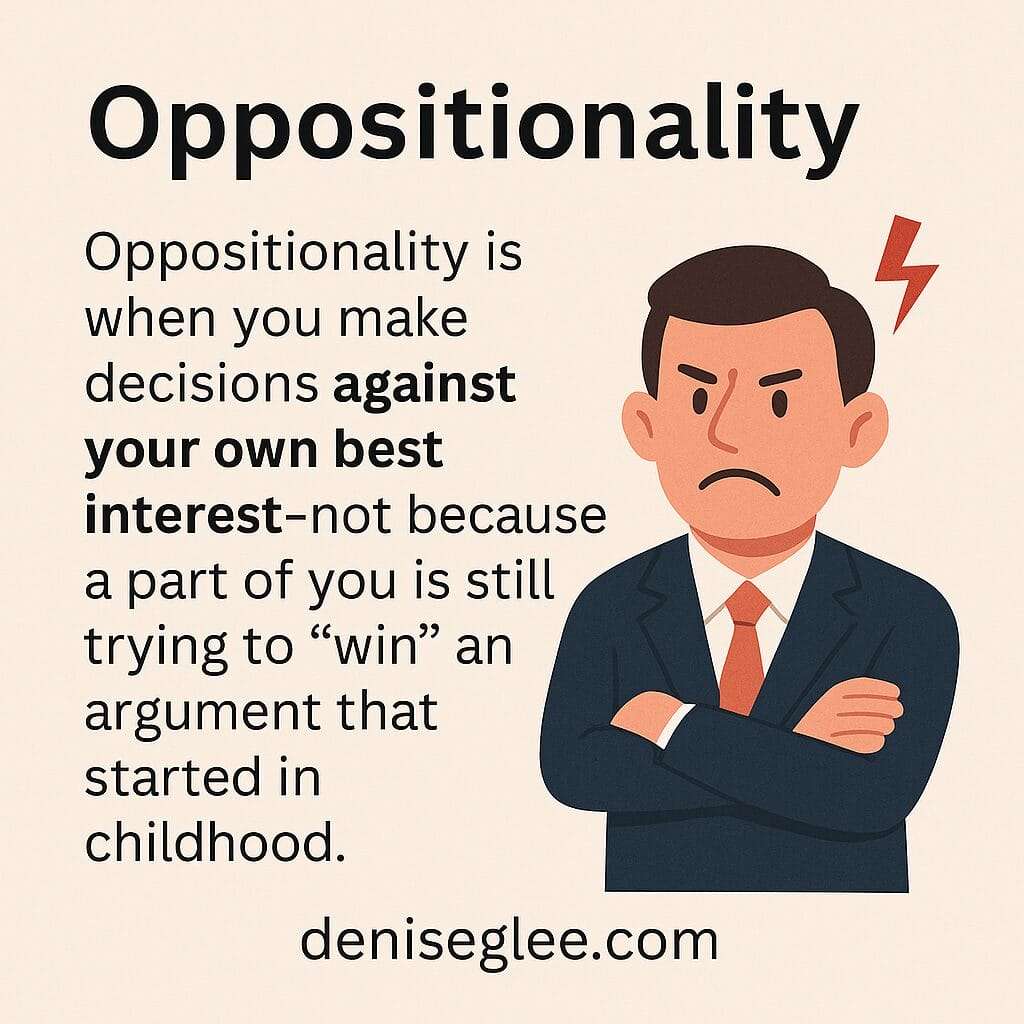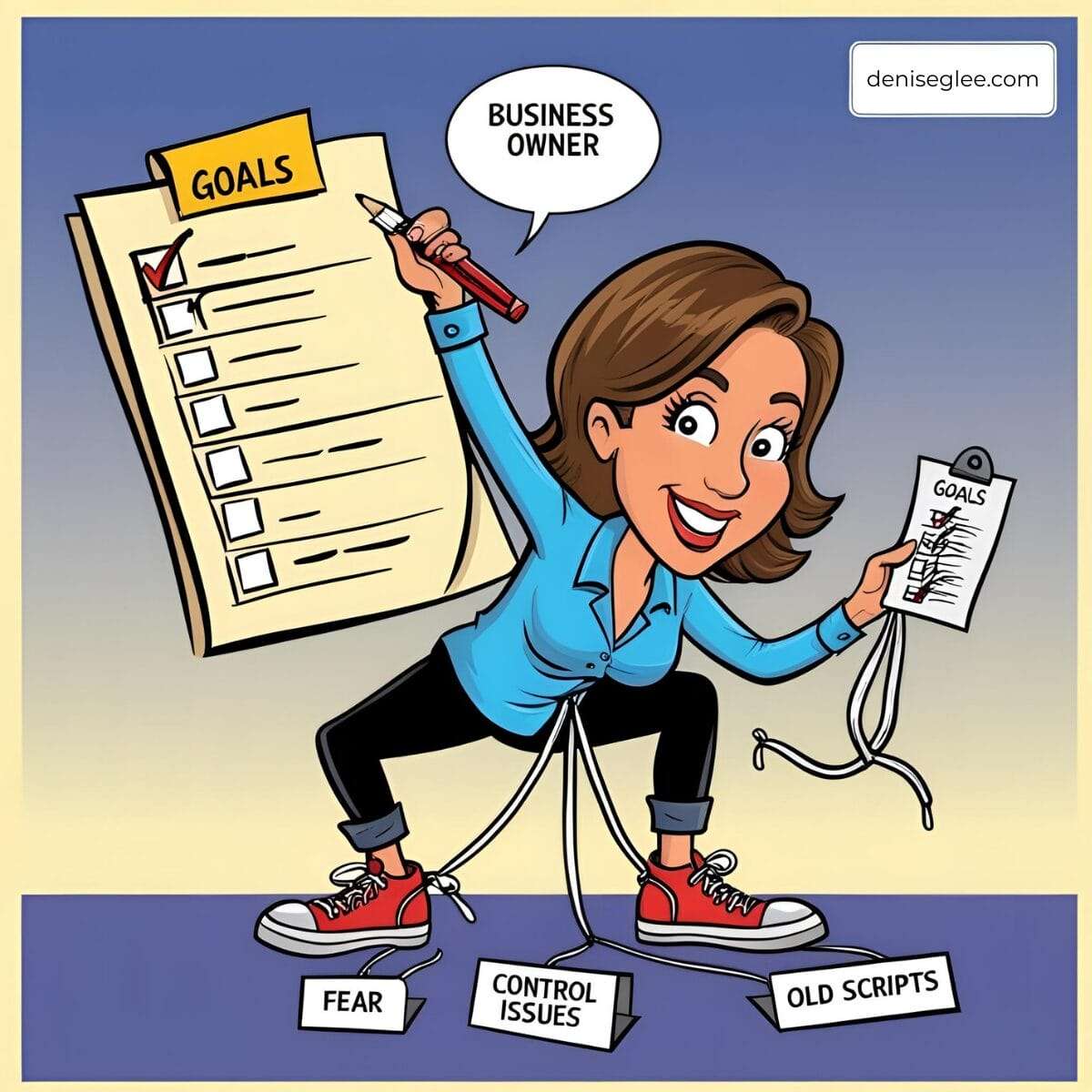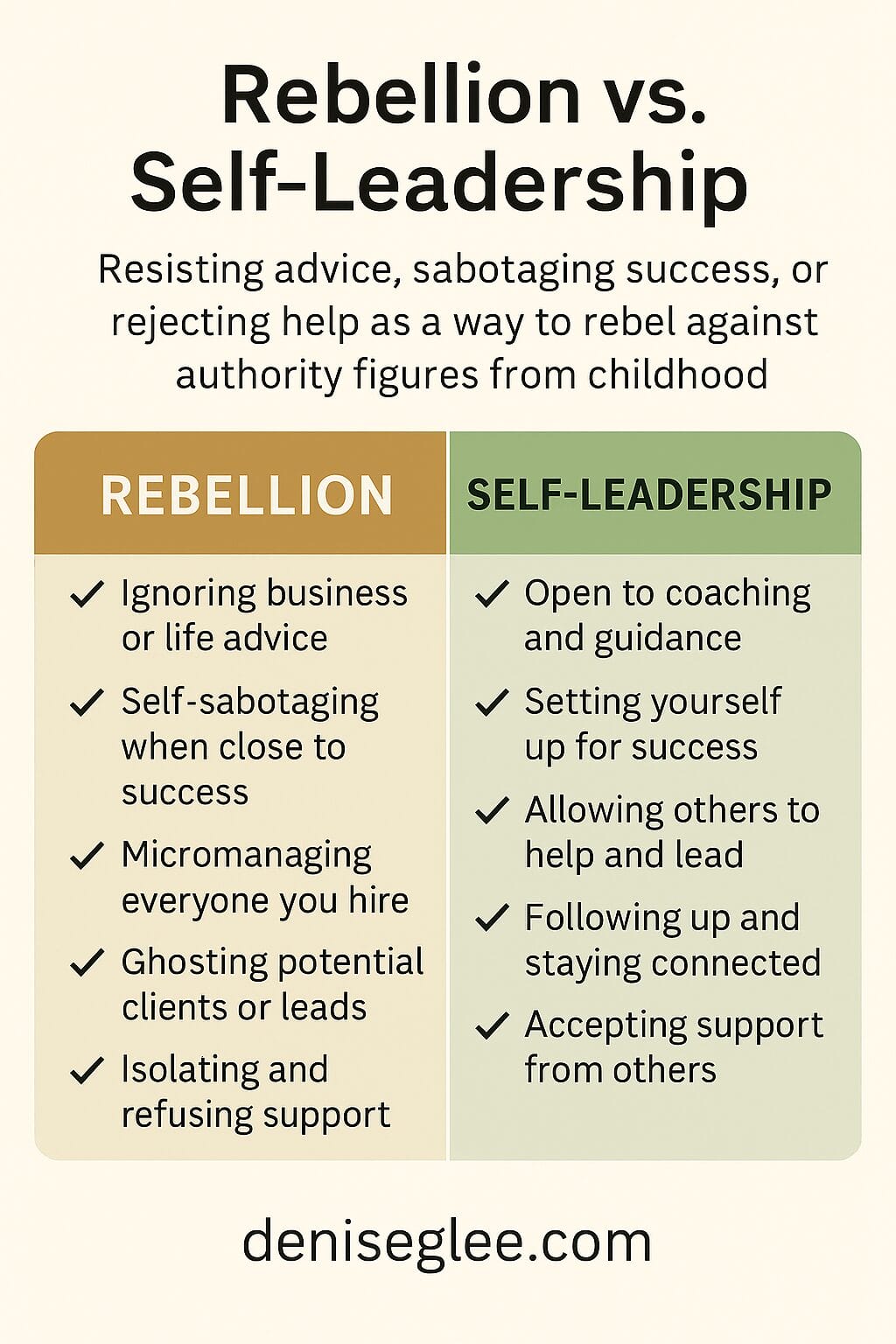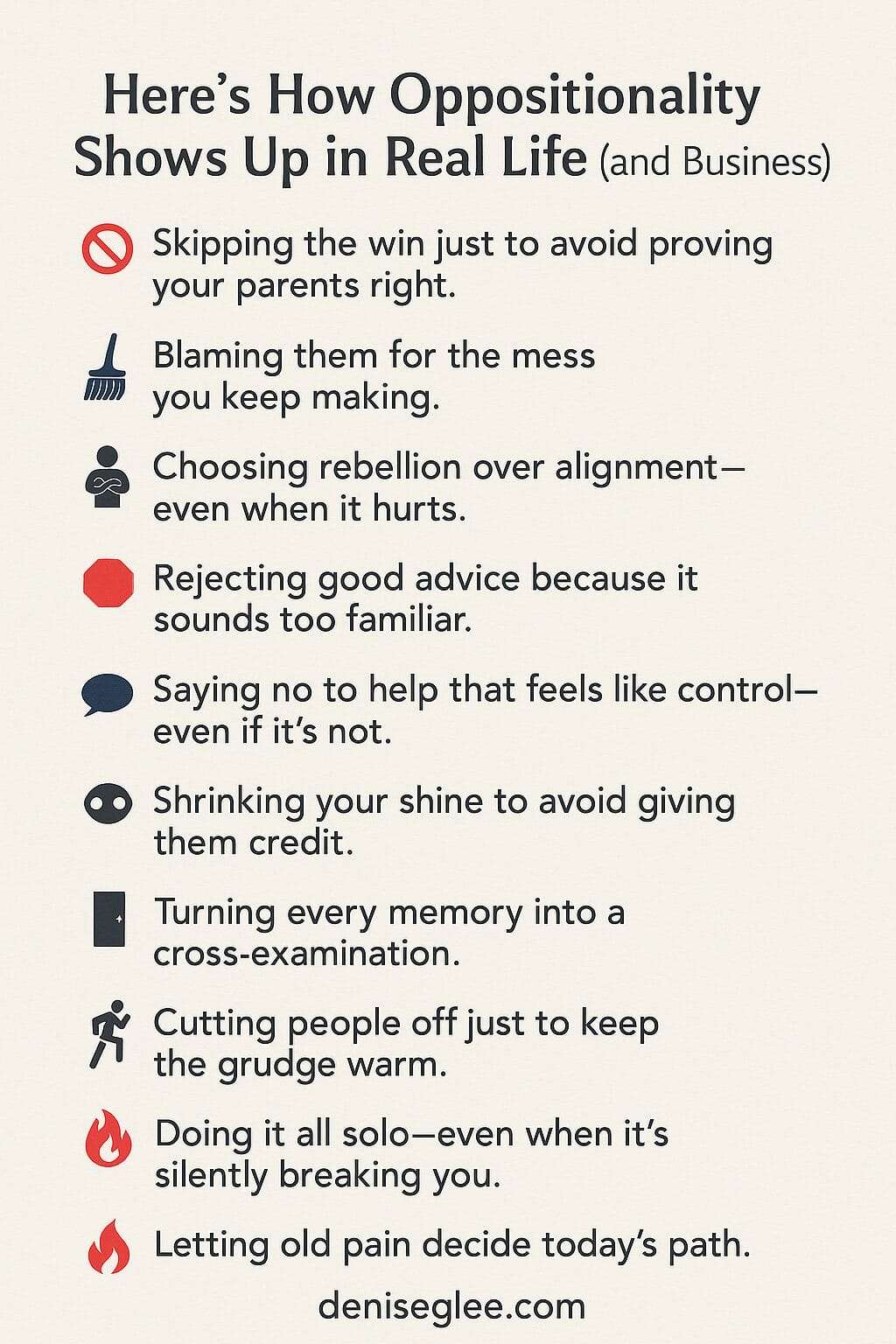- Updated: April 19, 2025
As a business owner, one of the biggest things standing in the way of your growth isn’t your marketing strategy, your sales funnel, or your visibility. It’s you. Yep, you.
Not because you’re lazy or untalented—but because you might be dragging around a suitcase full of emotional junk from childhood that’s leaking all over your calendar, client calls, and team meetings.
I’m talking about the kind of stuff that went down with your parents. The power struggles. The unspoken rules. The guilt. The need to prove something—or avoid everything.
As a healing and leadership coach, I help people spot the ways they’re unknowingly sabotaging their own success. And one sneaky culprit? Oppositional Defiant Disorder in adults—aka grown-up rebellion with a side of emotional landmines.
In this article, we’re diving into what adult oppositionality looks like (yes, it’s a thing), how it quietly messes with your business relationships, and most importantly—how to stop letting it run the show.
🧠 What Is Oppositionality (And Why It’s Screwing With Your Success)
Let’s break this down without the psych jargon.
Oppositionality is when you make decisions against your own best interest—not because it’s smart or strategic, but because a part of you is still trying to “win” an argument that started in childhood.
It’s the adult version of folding your arms and yelling, “You’re not the boss of me!”—except now, it’s not just aimed at your parents. It’s aimed at everyone. Yup—your clients, your coach, your team, your calendar… even yourself.

This doesn’t mean you’re immature or dramatic. It just means your nervous system got wired to resist authority—even if that “authority” is just someone trying to help you succeed. So when someone gives you great advice, you dismiss it. When things are going well, you self-sabotage. When someone offers support, you pull away. Because deep down, success might feel like they won.
From a clinical standpoint, oppositionality shows up when your actions go against the values or expectations of the people who raised you. It’s often rooted in unresolved pain from childhood—particularly in relationships with controlling or emotionally inconsistent parents.
Your subconscious thinks that failing at the things your parents would’ve celebrated is a way to reclaim power. So you rebel. Quietly. Subtly. Or sometimes, explosively.
Signs You’re Still Fighting a War That Ended Years Ago
In adulthood, oppositionality can look like this:
You’re close to finishing school, but drop out last minute—even if the degree aligns with your goals—because deep down, it’s what your parents wanted.
You sabotage a relationship because your mom loves your partner a little too much.
You ghost leads right after a successful discovery call—then tell yourself the vibe was off.
You hire someone to help, then micromanage them to death—or ignore everything they suggest.
You get hyper-independent to avoid “owing” anyone, even if it slows your growth.
All of that? It’s rebellion. And if it’s a persistent pattern, it may point to Oppositional Defiant Disorder (ODD)—a real, clinically recognized condition most often diagnosed in childhood.
While about 2–16% of children meet criteria for ODD, statistics for adults are less documented. That’s partly because the symptoms often overlap with other issues like anxiety, trauma, or mood disorders—and many adults never realize oppositionality is what’s running the show.
But just because the DSM isn’t tracking it doesn’t mean it’s not real.
Adult ODD shows up in hidden ways—through defiance, irritability, or subtle sabotage—and it can erode your relationships, career, and health.
No, this doesn’t mean you’re broken.
It means your nervous system is still trying to win a battle that ended years ago.
Oppositionality is a way of expressing the lasting pain or frustration from the past, leading to behaviors like rebelling against your parents' preferences, deliberately avoiding success, or pushing away their support.
Denise G. Lee Tweet
🔥 Real Talk: How ODD Sabotages Your Business (And Your Life)
Oppositional behavior doesn’t just show up when you’re yelling “You’re not the boss of me!” at your parents. It creeps into your business, too—usually disguised as logic, independence, or being misunderstood.
But let’s be real: if you’re always bristling at structure, resisting support, or blaming external forces… it’s not strategy. It’s scripting.
Here’s how oppositionality really plays out:

🧍♀️ With Clients:
Ghosting leads after a great sales call because suddenly “they felt pushy” (translation: they believed in you and it scared the hell out of your life script).
Overdelivering like your life depends on it, then resenting the client for not “appreciating you.”
Ignoring clear boundaries and rewriting client requests because you “know what’s best”—until you’re burned out, bitter, and wondering why everyone’s so “difficult.”
👩💻 With Team or Support:
Rejecting help, then complaining you’re overwhelmed. (Hello, I see you. Business Martyr.)
Micromanaging your assistant because you can’t trust anyone to do it “right”—even though you never trained them.
Getting defensive when your coach, VA, or strategist mirrors back a good idea… that sounds suspiciously like something your mom would say.
🎭 And Most Of All—With Yourself:
You say you want success, but refuse to do the things that would actually create it.
You collect advice, then disqualify every suggestion with a “Yes, but…”
You say you hate drama, but secretly set up Kick Me scenarios just to prove your worth to people who never asked you to.
You’re not lazy or broken. You’re just stuck in a psychological game loop—and your brain thinks it’s safer to keep playing it than to change the rules. Here’s the main idea you should know:
📜 You’re Running a Oppositionality Script
All this behavior? It’s not random. It’s scripted.
If you grew up in a household where expressing needs got you punished—or being successful made someone else feel small—your adult brain might still associate achievement with danger.
That’s the power of life scripting. You’re unconsciously reenacting old dynamics, trying to win battles that were never yours to begin with.
And until you rewrite the script, you’ll keep calling it “intuition” or “gut instinct” when it’s really just fear in disguise.
👉 Read: Are You Living a Scripted Life? How to Rewrite Your Life Script

❓Still Not Sure? Here’s How Oppositionality Shows Up in Real Life (and Business)
Sometimes we don’t realize we’re stuck in a pattern because it’s been our “normal” for so long. If you’re wondering whether you—or someone close to you—might be dealing with adult oppositional behavior, here are some signs to watch for:

🚫 Avoiding Success on Purpose
You pass on opportunities just to avoid making your parents proud.
Example: Skipping a promotion or dropping a goal—not because it doesn’t matter to you, but because they liked it.
🧹 Difficulty Taking Responsibility
You blame others—especially your parents—for problems that are actually yours to handle.
Example: “This is all their fault” becomes the fallback line, even when they’re not involved.
🔁 Rebellion in Decision-Making
You make choices that contradict your parents’ values—not because they align with yours, but just to be defiant.
Example: Choosing a job, partner, or lifestyle out of spite rather than desire.
🙅 Ignoring Advice
You automatically dismiss feedback that resembles anything your parents used to say.
Example: Taking the harder road just to prove no one can tell you what to do.
🛑 Refusing Help
You struggle alone instead of accepting support—especially from people who remind you of your parents.
Example: Turning down practical help out of fear it’ll make you look weak or dependent.
💬 Undermining Achievements
You downplay your success if it mirrors something your parents once wanted for you.
Example: Achieving something meaningful—then brushing it off or self-sabotaging it to avoid giving them credit.
👀 Excessive Criticism
You fixate on your parents’ flaws and let that fuel a never-ending list of grievances.
Example: Every interaction becomes a courtroom, and you’re always the judge.
🚪 Isolating Yourself
You avoid contact or cut ties—not to heal, but to keep the emotional war alive.
Example: Staying away from family just to prove a point or maintain control.
🧗 Overemphasis on Independence
You pride yourself on “doing it all alone,” even when it’s hurting your health, relationships, or business.
Example: Refusing delegation, collaboration, or emotional vulnerability—even when it costs you peace.
🔥 Holding onto Resentment
You let old wounds shape your current decisions.
Example: Letting the past run the show, even when it’s wrecking your present.
The image below sums it up.
Next, let’s talk about what you can do if you think you’re dealing with ODD.

🧠 You Might Have Adult Oppositional Defiant Disorder. Here’s What to Do Next.
I’ll save you a co-pay and break it down:
If you’ve got unresolved rage toward your parents, it’s running your life—and wrecking things you care about.
One of my clients scaled his business to multi-millions… only to torch it the moment his father told him he was proud. He claimed he was just “burned out,” but as we dug deeper, his jaw tightened, his fists clenched, and it became clear—he didn’t want to succeed on his father’s terms. The one time his dad paid attention? Was when he made a lot of money.
If that hits a nerve—and if you recognized yourself in at least half the signs above—there’s a good chance you’re dealing with adult oppositionality, whether or not you’ve got an official diagnosis.
Moving past denial is step one.
Step two? Facing the anger, shame, fear, and heartbreak that come with realizing your parents trained you to stay small—and you’ve been playing right into it.
Untangling this doesn’t happen overnight.
It takes honesty. Vulnerability. And someone who can see through the sophisticated mask you’ve built to survive your story.
You don’t need to carry this alone.
Work with a licensed therapist or a trauma-informed coach (like me) who understands the emotional landmines of achievement, rebellion, and family scripting.
Because the longer this goes unaddressed, the more damage it does—to your relationships, your business, and your peace.
In the next section, I’ll share some final thoughts to help you take your next step.
Final Thoughts
Oppositional Defiant Disorder is messy because it forces you to confront what most people spend their whole lives avoiding: pain-filled, unresolved emotional junk from the past.
But like Carl Jung said, “What you resist, persists.” And if you keep pushing those old feelings aside, they’ll keep showing up—in your business, your relationships, your leadership, your peace.
Seeking help isn’t weakness. It’s strength.
It’s ownership.
And for a lot of people? It’s the turning point.
Too many folks are stuck failing in this business called life simply because they haven’t traced the source of their rage, fear, or rebellion. But you can. And that changes everything.
If this hit home for you, I’d love to hear what came up.
💛 Send me a message
If you’re ready to go deeper, don’t do it alone.
🎧 Click the play button below to listen to a powerful episode from my podcast that expands on this topic.
And remember:
You’re not too far gone. You’re just ready to stop pretending you’re fine.
That’s not failure. That’s healing.



